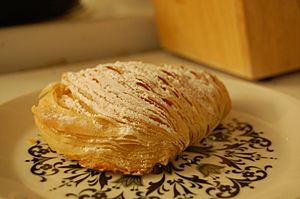Sfogliatella facts for kids

Sfogliatella
|
|
| Type | Pastry |
|---|---|
| Place of origin | Italy |
| Region or state | Campania |
| Main ingredients | Pastry dough |
| Variations | Many types of fillings |
A sfogliatella (pronounced sfo-lya-TELL-ah) is a special shell-shaped Italian pastry. It comes from a region in Italy called Campania. In the United States, people sometimes call it a "lobster tail."
The name Sfogliatella means "small, thin leaf" or "layer." This is because the pastry has many thin layers, like stacked leaves.
Contents
Where Sfogliatella Began
The first sfogliatella was created a long time ago in the 1600s. It was made in a monastery called Santa Rosa in Conca dei Marini, Italy.
Later, in 1818, a pastry chef named Pasquale Pintauro from Naples got the original recipe. He started selling these delicious pastries in his own shop.
How Sfogliatella is Made
Making a sfogliatella takes a lot of skill! First, the dough is stretched out very thin on a large table. Sometimes, a pasta maker helps to flatten it.
Next, the thin dough is brushed with a type of fat, like butter or lard. Then, it's rolled up tightly into a long log, similar to a Swiss roll. This rolling creates many, many layers.
Small disks are cut from the end of the log. Each disk is shaped into a pocket. These pockets are then filled with tasty ingredients. Common fillings include orange-flavored ricotta cheese, almond paste, and candied citron peel.
Finally, the pastries are baked. As they bake, the many layers separate. This creates the sfogliatella's unique wavy ridges.
Different Kinds of Sfogliatella
In Naples, there are two main types of sfogliatella:
- Sfogliatella riccia: This is the "curly" or classic version. It's the one with all the thin, crispy layers.
- Sfogliatella frolla: This version is easier to make. It uses a different kind of dough called shortcrust pastry. It does not have the many layers that the riccia version does.
There is also a variation called coda d'aragosta, which means "lobster tail" in Italian. This pastry has the same layered crust as the riccia. However, it has a sweeter filling, often a creamy French cream.
Images for kids
See also
 In Spanish: Sfogliatelle para niños
In Spanish: Sfogliatelle para niños
 | Audre Lorde |
 | John Berry Meachum |
 | Ferdinand Lee Barnett |


